The Candidiasis Therapeutics Market is estimated to be valued at USD 3.4 billion in 2025 and is projected to reach USD 4.7 billion by 2035, registering a compound annual growth rate (CAGR) of 3.3% over the forecast period.
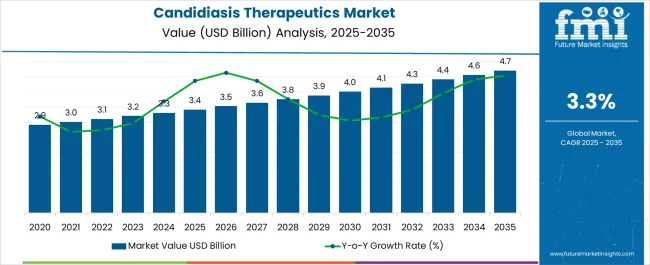
| Metric | Value |
|---|---|
| Candidiasis Therapeutics Market Estimated Value in (2025 E) | USD 3.4 billion |
| Candidiasis Therapeutics Market Forecast Value in (2035 F) | USD 4.7 billion |
| Forecast CAGR (2025 to 2035) | 3.3% |
The candidiasis therapeutics market is experiencing consistent expansion, supported by the increasing prevalence of fungal infections and the growing need for effective antifungal treatments across both developed and emerging regions. The rise in immunocompromised patient populations, including individuals undergoing chemotherapy, organ transplantation, or long-term antibiotic therapy, is contributing significantly to demand. Advancements in antifungal drug formulations, combined with improvements in diagnosis and targeted treatment strategies, are further strengthening market development.
The growing awareness of fungal infections and the need for early treatment interventions are influencing prescribing patterns across healthcare systems. Additionally, the expanding presence of resistant Candida strains has heightened the demand for novel and combination therapies, leading pharmaceutical companies to invest in new drug classes and delivery methods.
With healthcare infrastructures placing greater emphasis on infection control and patient outcomes, candidiasis therapeutics are increasingly prioritized As global healthcare expenditures rise and personalized medicine continues to shape treatment approaches, the market is expected to benefit from continuous innovation and broader patient accessibility, ensuring strong long-term growth prospects.
The candidiasis therapeutics market is segmented by route of administration, class of drugs, anatomy type, distribution channel, and geographic regions. By route of administration, candidiasis therapeutics market is divided into Oral, Injection, and Ointment. In terms of class of drugs, candidiasis therapeutics market is classified into Azole, Polyene, Echinocandin, and Miscellaneou. Based on anatomy type, candidiasis therapeutics market is segmented into Vulvovaginal Candidiasis, Oral Candidiasis, Cutaneous Candidiasis, Invasive Candidiasis, and Systemic Candidiasis. By distribution channel, candidiasis therapeutics market is segmented into Hospitals, Clinics, Retail Pharmacies, and Drug Stores. Regionally, the candidiasis therapeutics industry is classified into North America, Latin America, Western Europe, Eastern Europe, Balkan & Baltic Countries, Russia & Belarus, Central Asia, East Asia, South Asia & Pacific, and the Middle East & Africa.
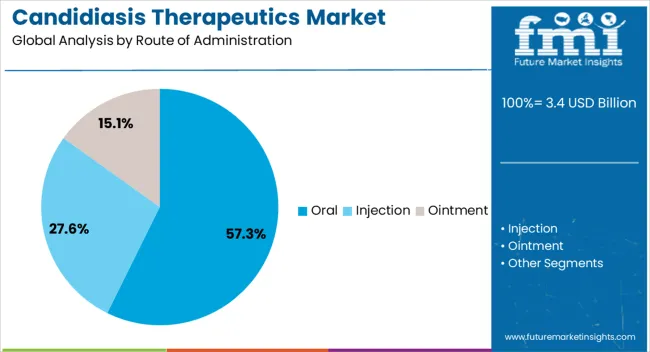
The oral route of administration segment is projected to account for 57.3% of the candidiasis therapeutics market revenue share in 2025, positioning it as the leading route of administration. This dominance is being driven by the convenience, accessibility, and patient compliance associated with oral formulations. The ability of oral drugs to deliver systemic therapy makes them suitable for a wide range of candidiasis infections, including both localized and invasive forms.
The cost-effectiveness of oral medications compared to parenteral therapies has further encouraged widespread adoption in outpatient and hospital settings. Pharmaceutical companies have focused on developing extended-release and improved bioavailability formulations, enhancing therapeutic outcomes and reducing dosing frequency. The ease of prescribing and dispensing oral antifungals is reinforcing their acceptance among healthcare providers, particularly in regions with limited access to advanced hospital infrastructure.
Growing demand for self-administered and less invasive treatment options is also contributing to the segment’s growth As resistance challenges continue to influence therapeutic decisions, oral antifungals remain a preferred first-line treatment, ensuring the sustained dominance of this segment in the market.
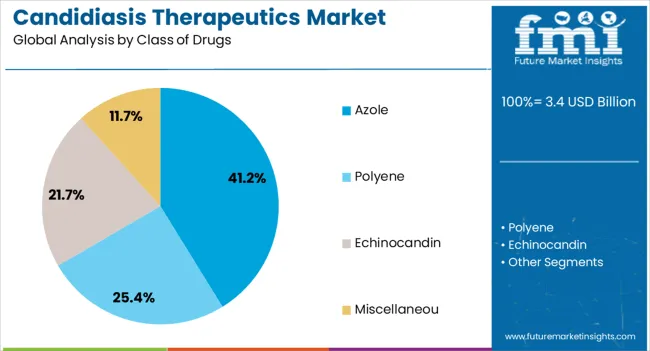
The azole class of drugs segment is expected to hold 41.2% of the candidiasis therapeutics market revenue share in 2025, making it the dominant drug category. This leadership is being reinforced by the broad-spectrum antifungal activity of azoles, which makes them highly effective against Candida infections. Their established efficacy, favorable safety profile, and availability in multiple formulations such as oral, topical, and intravenous have strengthened their position in clinical practice.
The ability of azoles to inhibit fungal cell membrane synthesis provides consistent therapeutic results across both superficial and systemic infections. Widespread availability as generic options has further expanded patient accessibility, contributing to market penetration in both high-income and cost-sensitive regions. Despite emerging resistance concerns, continuous advancements in formulation science and the development of next-generation azoles are sustaining their clinical relevance.
Healthcare providers continue to prefer azoles for first-line treatment due to their balance of efficacy and affordability The segment’s leadership is also being reinforced by growing global demand for effective, reliable, and widely available antifungal agents, securing its continued prominence in the market.
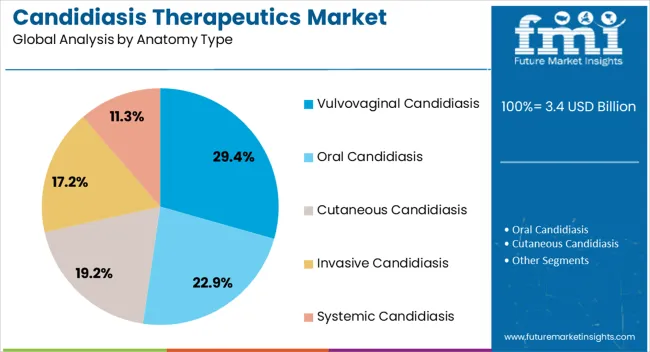
The vulvovaginal candidiasis segment is projected to represent 29.4% of the candidiasis therapeutics market revenue share in 2025, making it the leading anatomy type. Its prominence is being driven by the high incidence of vulvovaginal infections among women of reproductive age, combined with recurrent infection patterns that increase treatment needs. Growing awareness of women’s health and the importance of timely treatment for quality-of-life improvement are reinforcing demand for targeted antifungal therapies.
The segment benefits from the availability of both over-the-counter and prescription medications, making treatment more accessible to a broad patient base. Advances in formulations, including oral, topical, and combination therapies, are improving patient adherence and treatment success rates. Rising prevalence of risk factors such as diabetes, hormonal changes, and the use of broad-spectrum antibiotics is further influencing infection rates.
Healthcare initiatives promoting awareness of fungal infections and the importance of early medical intervention are also contributing to market expansion With continued focus on improving therapeutic options for recurrent and resistant cases, vulvovaginal candidiasis treatments are expected to remain central in the overall market landscape.
• Serious Consequences of Skin Infections
As new lines of therapy for skin infections emerge, the global market for candidiasis treatments is predicted to generate substantial revenues. Additionally, several medical professionals have underlined the need to provide the best care possible for patients with any kind of skin infection. This is because even a small skin infection might endanger a person's general health.
• Developments in the Dermatology Field
Therapeutics for treating candidiasis are expected to provide substantial revenues as dermatology draws new funding. The development of innovative medications for treating skin infections has also been aided by several efforts, which have accelerated the expansion of the worldwide candidiasis therapeutics market. In the coming years, market growth is anticipated to be aided by the increasing public preference for skin care.
Vulvovaginal candidiasis (VVC) is a vaginal fungal infection that has been proven to be brought on by a member of the Candida genus, typically Candida albicans. Other Candida species or yeasts can occasionally be the source of the VVC. Since VVC is a relapsing vaginal fungal infection, it is also known as recurrent vulvovaginal candidiasis (RVVC). The high prevalence of infection among the population is fueling segment growth, and the future is expected to be positive for the vulvovaginal candidiasis market.
Growth in the category is also anticipated to be boosted by more research into the prevalence of VVC or RVVC. According to a study released in August 2025 titled "Treating (Recurrent) Vulvovaginal Candidiasis with Medical-Grade Honey-Concepts and Practical Considerations," the prevalence varies depending on the population's age and can reach as high as 9%. Relapses happen within six months after fluconazole maintenance medication (most often used treatment among other possibilities) in 57% of the cases because there aren't any other options for treatment.
The segment of vulvovaginal candidiasis, therefore, demands additional attention and therapies for treatment due to the high frequency of infection among the target group, thus driving the segment's expansion in the process.
Additionally, more research and development (R&D) is conducted for the segment. The development of products for vaginal yeast infections by major manufacturers is expected to fuel the segment's growth. For instance, Brexafemme (ibrexafungerp) was introduced in the United States in February 2025 thanks to a partnership between SCYNEXIS, Inc., a biotechnology company specializing in the development of therapies and medications for fungal infections, and Amplity Health, one of the world's top contract commercialization organizations.
Additionally, Mycovia Pharmaceutical's brand-new drug VIVJOA (oteseconazole), the first to earn FDA approval, is now the only treatment option for chronic yeast infections or recurrent vulvovaginal candidiasis (RVC). Therefore, it is projected that the segment's growing R&D will fuel expansion. As a result, the aforementioned factors are projected to propel sector growth, which will fuel the anticipated expansion of the market.
Increase in number of patients affected by candidiasis infection, increasing consumer inclination towards maintaining aesthetic appearance and growing awareness for candidiasis infection in developing markets are expected to boost the market growth over the forecast period. This is mainly due to urbanization and rising hygiene awareness in developing countries.
Less R&D activity in this sector and availability of alternative treatments is expected to restraint the candidiasis therapeutics market over the forecast year. The factors such as narrow pipeline molecules and competition from herbal medicines and alternate therapies such as probiotic are expected to restrain the market growth over the forecast period.
The global market for anti-candidiasis agents is expected to grow with a healthy CAGR over the forecast period. The market for systemic candidiasis is driven by increases in the susceptible immune compromised patient pool. Thrush occurs in approximately 2–5 percent of healthy new born and affect them mainly during their first year of life. Over 1 million adult women and adolescent girls in the USA develop vaginal yeast infections each year.
Based on geographic regions, gastroesophageal reflux disease therapeutics market is segmented into seven key regions: North America, Latin America, Eastern Europe, Western Europe, Japan, Asia Pacific and Middle East & Africa. The disease is growing globally and is not restricted to any particular region.
North America and Europe region account for the largest markets revenue share due to higher awareness of the disease amongst individuals and also availability of better treatment. Asia-Pacific also offers considerable opportunities owing to low unmet need in this region.
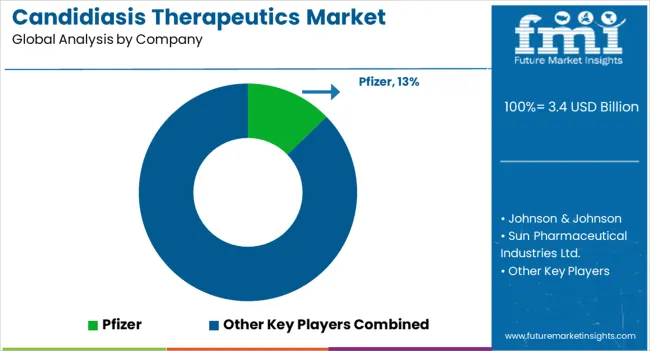
The anti-fungal candidiasis treatment is a highly fragmented mature market with a large number of generics. Major players in the market are Bayer, Teva Pharmaceuticals, Stellar Pharma, Pfizer, Wockhardt, Ranbaxy, Bristol Laboratories, Glenmark Pharmaceuticals, Taro Pharmaceuticals and Perrigo among many other local players.
There are several types of formulations available for treatment based on the modality such as pills, powders, ointments and injectable. In 2025, Astellas Pharma reported positive results from its phase III drug isavuconazole which is one of the only first-in-class molecules expected to enter the market.
The research report presents a comprehensive assessment of the market and contains thoughtful insights, facts, historical data, and statistically supported and industry-validated market data. It also contains projections using a suitable set of assumptions and methodologies. The research report provides analysis and information according to categories such as market segments, geographies, type of product and applications.
The report is a compilation of first-hand information, qualitative and quantitative assessment by industry analysts, inputs from industry experts and industry participants across the value chain. The report provides in-depth analysis of parent market trends, macro-economic indicators and governing factors along with market attractiveness as per segments. The report also maps the qualitative impact of various market factors on market segments and geographies.
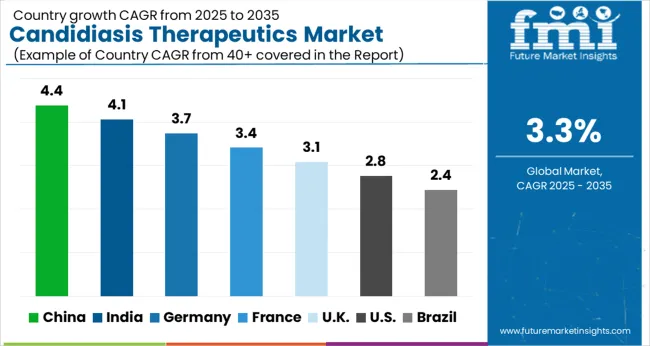
| Country | CAGR |
|---|---|
| China | 4.4% |
| India | 4.1% |
| Germany | 3.7% |
| France | 3.4% |
| UK | 3.1% |
| USA | 2.8% |
| Brazil | 2.4% |
The Candidiasis Therapeutics Market is expected to register a CAGR of 3.3% during the forecast period, exhibiting varied country level momentum. China leads with the highest CAGR of 4.4%, followed by India at 4.1%. Developed markets such as Germany, France, and the UK continue to expand steadily, while the USA is likely to grow at consistent rates. Brazil posts the lowest CAGR at 2.4%, yet still underscores a broadly positive trajectory for the global Candidiasis Therapeutics Market. In 2024, Germany held a dominant revenue in the Western Europe market and is expected to grow with a CAGR of 3.7%. The USA Candidiasis Therapeutics Market is estimated to be valued at USD 1.3 billion in 2025 and is anticipated to reach a valuation of USD 1.7 billion by 2035. Sales are projected to rise at a CAGR of 2.8% over the forecast period between 2025 and 2035. While Japan and South Korea markets are estimated to be valued at USD 185.6 million and USD 118.6 million respectively in 2025.
| Item | Value |
|---|---|
| Quantitative Units | USD 3.4 Billion |
| Route of Administration | Oral, Injection, and Ointment |
| Class of Drugs | Azole, Polyene, Echinocandin, and Miscellaneou |
| Anatomy Type | Vulvovaginal Candidiasis, Oral Candidiasis, Cutaneous Candidiasis, Invasive Candidiasis, and Systemic Candidiasis |
| Distribution Channel | Hospitals, Clinics, Retail Pharmacies, and Drug Stores |
| Regions Covered | North America, Europe, Asia-Pacific, Latin America, Middle East & Africa |
| Country Covered | United States, Canada, Germany, France, United Kingdom, China, Japan, India, Brazil, South Africa |
| Key Companies Profiled | Pfizer, Johnson & Johnson, Sun Pharmaceutical Industries Ltd., Teva Pharmaceutical Industries Ltd., Shionogi & Co. Ltd., Cadila Healthcare, GlaxoSmithKline, Novartis AG, Mylan N.V., HoffmannLa Roche Ltd., Astellas Pharma Inc., Cipla, BristolMyers Squibb, and Merck & Co. Inc. |
The global candidiasis therapeutics market is estimated to be valued at USD 3.4 billion in 2025.
The market size for the candidiasis therapeutics market is projected to reach USD 4.7 billion by 2035.
The candidiasis therapeutics market is expected to grow at a 3.3% CAGR between 2025 and 2035.
The key product types in candidiasis therapeutics market are oral, injection and ointment.
In terms of class of drugs, azole segment to command 41.2% share in the candidiasis therapeutics market in 2025.






Our Research Products

The "Full Research Suite" delivers actionable market intel, deep dives on markets or technologies, so clients act faster, cut risk, and unlock growth.

The Leaderboard benchmarks and ranks top vendors, classifying them as Established Leaders, Leading Challengers, or Disruptors & Challengers.

Locates where complements amplify value and substitutes erode it, forecasting net impact by horizon

We deliver granular, decision-grade intel: market sizing, 5-year forecasts, pricing, adoption, usage, revenue, and operational KPIs—plus competitor tracking, regulation, and value chains—across 60 countries broadly.

Spot the shifts before they hit your P&L. We track inflection points, adoption curves, pricing moves, and ecosystem plays to show where demand is heading, why it is changing, and what to do next across high-growth markets and disruptive tech

Real-time reads of user behavior. We track shifting priorities, perceptions of today’s and next-gen services, and provider experience, then pace how fast tech moves from trial to adoption, blending buyer, consumer, and channel inputs with social signals (#WhySwitch, #UX).

Partner with our analyst team to build a custom report designed around your business priorities. From analysing market trends to assessing competitors or crafting bespoke datasets, we tailor insights to your needs.
Supplier Intelligence
Discovery & Profiling
Capacity & Footprint
Performance & Risk
Compliance & Governance
Commercial Readiness
Who Supplies Whom
Scorecards & Shortlists
Playbooks & Docs
Category Intelligence
Definition & Scope
Demand & Use Cases
Cost Drivers
Market Structure
Supply Chain Map
Trade & Policy
Operating Norms
Deliverables
Buyer Intelligence
Account Basics
Spend & Scope
Procurement Model
Vendor Requirements
Terms & Policies
Entry Strategy
Pain Points & Triggers
Outputs
Pricing Analysis
Benchmarks
Trends
Should-Cost
Indexation
Landed Cost
Commercial Terms
Deliverables
Brand Analysis
Positioning & Value Prop
Share & Presence
Customer Evidence
Go-to-Market
Digital & Reputation
Compliance & Trust
KPIs & Gaps
Outputs
Full Research Suite comprises of:
Market outlook & trends analysis
Interviews & case studies
Strategic recommendations
Vendor profiles & capabilities analysis
5-year forecasts
8 regions and 60+ country-level data splits
Market segment data splits
12 months of continuous data updates
DELIVERED AS:
PDF EXCEL ONLINE
Biotherapeutics Virus Removal Filters Market Trends – Growth & Forecast 2025 to 2035
COPD Therapeutics Market Report – Growth, Demand & Industry Forecast 2023-2033
Digital Therapeutics and Wellness Market Size and Share Forecast Outlook 2025 to 2035
Digital Therapeutics Market Size and Share Forecast Outlook 2025 to 2035
Peptide Therapeutics Market Analysis - Growth & Forecast 2024 to 2034
Advanced Therapeutics Pharmaceutical Outsourcing Market Size and Share Forecast Outlook 2025 to 2035
Glaucoma Therapeutics Market Size and Share Forecast Outlook 2025 to 2035
Leukemia Therapeutics Treatment Market Analysis - Growth & Forecast 2025 to 2035
Microbiome Therapeutics Market Size and Share Forecast Outlook 2025 to 2035
The Canine Flu Therapeutics Market is segmented by product, and end user from 2025 to 2035
Stuttering Therapeutics Market Trends, Analysis & Forecast by Treatment, Type, End-Use and Region through 2035
Pet Cancer Therapeutics Market Insights - Growth & Forecast 2024 to 2034
Lung Cancer Therapeutics Market Analysis – Size, Share, and Forecast Outlook 2025 to 2035
Heart Block Therapeutics Market Size and Share Forecast Outlook 2025 to 2035
Aquaculture Therapeutics Market Size and Share Forecast Outlook 2025 to 2035
Fucosidosis Therapeutics Market - Growth & Innovations 2025 to 2035
Market Leaders & Share in Alzheimer’s Therapeutics
Alzheimer’s Therapeutics Market Analysis by Disease Class into Cholinesterase Inhibitors, NMDA Receptor Antagonists and Combinations Through 2035.
Sarcoidosis Therapeutics Market
Tuberculosis Therapeutics Market Size and Share Forecast Outlook 2025 to 2035

Thank you!
You will receive an email from our Business Development Manager. Please be sure to check your SPAM/JUNK folder too.
Chat With
MaRIA